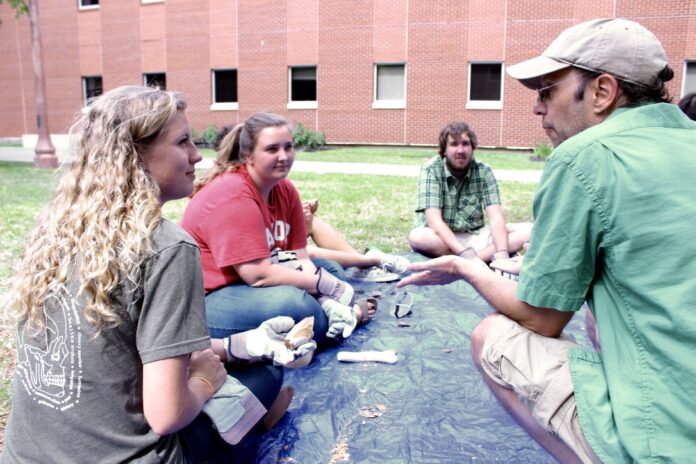
By Caitlyn Beebe | Reporter
Students are invited to taste goat meat, throw spears and make stone tools at the anthropology department’s annual goat roast on Friday.
Dr. Katie Binetti, undergraduate program director of anthropology, said the goat roast will expose students of all majors to the experiences of ancient humans and to modern, non-Western cultures.
For many students, Binetti said the goat roast will be their first time tasting goat meat. However, Binetti said goat meat appears in dishes in most parts of the world.
“Most people in most parts of the world consume goat at some point,” Binetti said. “Goats are probably the most commonly small-herded animal, and because of that, they are widely available, even in poorer communities.”
At previous goat roasts, Binetti said the central dish has been prepared as a traditional Indian curry, as a roast or with seasoning inspired by specific cultures.
Binetti said the goat roast will also feature spear-throwing. Students will be able to throw spears using an atlatl — a device that enables them to be thrown at much greater distances and speeds.
“How far [the spears] go is always shocking to them,” Binetti said. “They always feel like superheroes after they’ve thrown a spear with an atlatl.”
Dr. Joseph Ferraro, associate professor of anthropology, said the goat roast will also give students a chance to make their own stone tools and to learn how to butcher lamb shanks.
“They get the caveman experience,” Ferraro said. “They get to experience making the tools and using the tools.”
Ferraro said students will make stone tools through the process of flintknapping, where the toolmaker chips away at the stone to shape the tool. Students will also learn how to use the tools to butcher meat and extract the marrow inside of the bones.
Ferraro said the meat that the students butcher won’t be eaten. However, the bones will be kept in Marrs McLean Science Building. Using a box of Texas-native flesh-eating beetles, the bones will be cleaned up to help with studying the cut marks left on butchered bones.
“We can study these bones as part of a modern-day archaeological record,” Ferraro said. “We can look at the cut marks on the bones in a modern-day context. And then we can project this into the past and how might we interpret butchered bones at past archaeological sites.”
Binetti said the goat roast is a tradition shared by many anthropology departments across the U.S. The tradition started at Harvard in the 1980s and inspired Binetti and a Harvard-graduate colleague to host Baylor’s own goat roast.
“We decided to give it a try here, and we got a great response,” Binetti said. “Students really found it fun and interesting and different.”
Binetti said the goat roast introduces students to new experiences while also recognizing that these activities were once universal practices among ancestors.
“One of the goals of anthropology is to find commonality even in diversity, so it’s celebrating diversity but also celebrating what we all share,” Binetti said.
Students of all majors are invited to attend the goat roast, which will be hosted on Friday in Bear Park behind Marrs McLean Science Building.
“It’ll be pretty obvious,” Ferraro said. “We’ll be the ones with the spears.”





